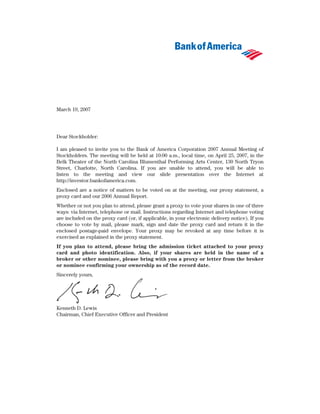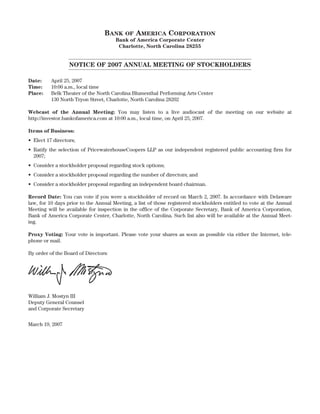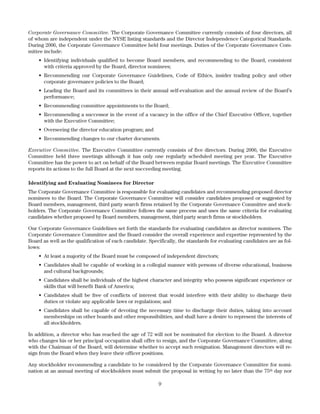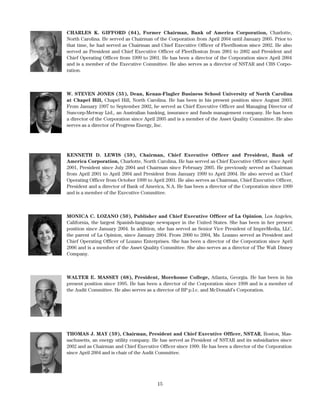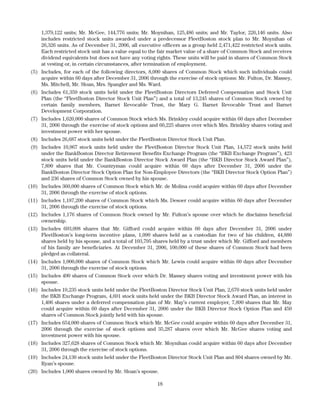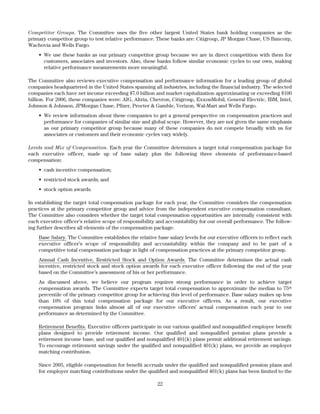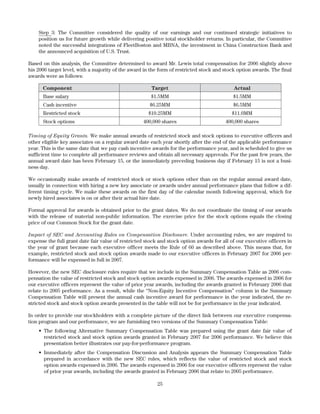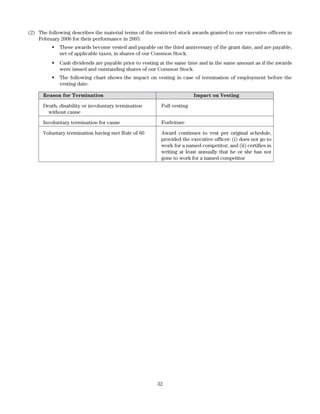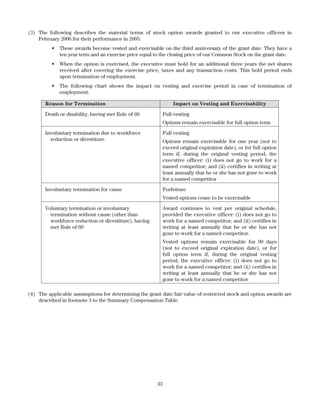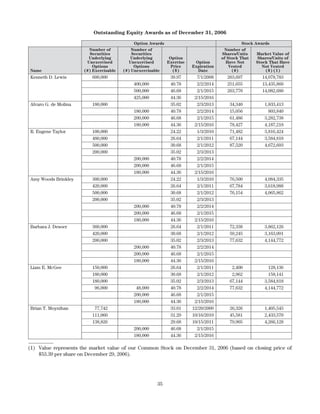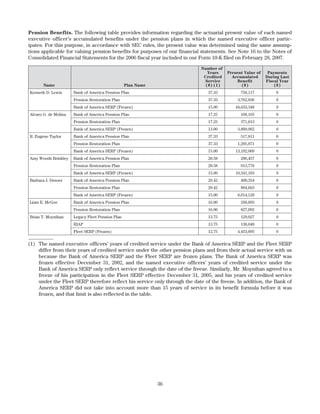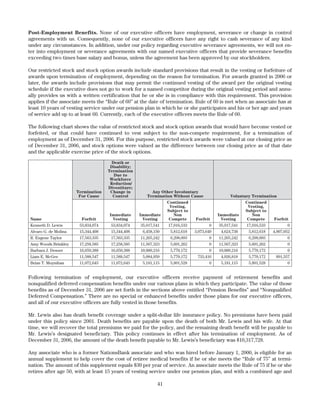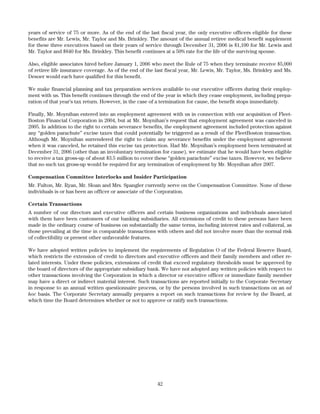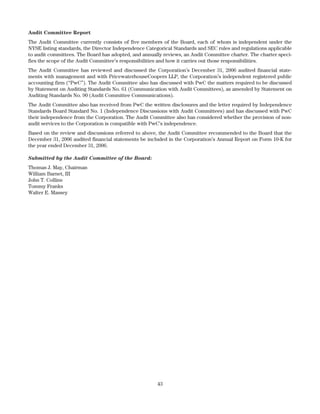BANK OF AMERICA 2007 Proxy Statement in
- 1. March 19, 2007 Dear Stockholder: I am pleased to invite you to the Bank of America Corporation 2007 Annual Meeting of Stockholders. The meeting will be held at 10:00 a.m., local time, on April 25, 2007, in the Belk Theater of the North Carolina Blumenthal Performing Arts Center, 130 North Tryon Street, Charlotte, North Carolina. If you are unable to attend, you will be able to listen to the meeting and view our slide presentation over the Internet at http://investor.bankofamerica.com. Enclosed are a notice of matters to be voted on at the meeting, our proxy statement, a proxy card and our 2006 Annual Report. Whether or not you plan to attend, please grant a proxy to vote your shares in one of three ways: via Internet, telephone or mail. Instructions regarding Internet and telephone voting are included on the proxy card (or, if applicable, in your electronic delivery notice). If you choose to vote by mail, please mark, sign and date the proxy card and return it in the enclosed postage-paid envelope. Your proxy may be revoked at any time before it is exercised as explained in the proxy statement. If you plan to attend, please bring the admission ticket attached to your proxy card and photo identification. Also, if your shares are held in the name of a broker or other nominee, please bring with you a proxy or letter from the broker or nominee confirming your ownership as of the record date. Sincerely yours, Kenneth D. Lewis Chairman, Chief Executive Officer and President
- 3. BANK OF AMERICA CORPORATION Bank of America Corporate Center Charlotte, North Carolina 28255 NOTICE OF 2007 ANNUAL MEETING OF STOCKHOLDERS Date: April 25, 2007 Time: 10:00 a.m., local time Place: Belk Theater of the North Carolina Blumenthal Performing Arts Center 130 North Tryon Street, Charlotte, North Carolina 28202 Webcast of the Annual Meeting: You may listen to a live audiocast of the meeting on our website at http://investor.bankofamerica.com at 10:00 a.m., local time, on April 25, 2007. Items of Business: • Elect 17 directors; • Ratify the selection of PricewaterhouseCoopers LLP as our independent registered public accounting firm for 2007; • Consider a stockholder proposal regarding stock options; • Consider a stockholder proposal regarding the number of directors; and • Consider a stockholder proposal regarding an independent board chairman. Record Date: You can vote if you were a stockholder of record on March 2, 2007. In accordance with Delaware law, for 10 days prior to the Annual Meeting, a list of those registered stockholders entitled to vote at the Annual Meeting will be available for inspection in the office of the Corporate Secretary, Bank of America Corporation, Bank of America Corporate Center, Charlotte, North Carolina. Such list also will be available at the Annual Meet- ing. Proxy Voting: Your vote is important. Please vote your shares as soon as possible via either the Internet, tele- phone or mail. By order of the Board of Directors: William J. Mostyn III Deputy General Counsel and Corporate Secretary March 19, 2007
- 4. Table of Contents General Information . . . . . . . . . . . . . . . . . . . . . . . . . . . . . . . . . . . . . . . . . . . . . . . . . . . . . . . . . . . . . . . . . . . . . . . . . . . . 1 Corporate Governance . . . . . . . . . . . . . . . . . . . . . . . . . . . . . . . . . . . . . . . . . . . . . . . . . . . . . . . . . . . . . . . . . . . . . . . . . . 3 Commitment to Corporate Governance Best Practices . . . . . . . . . . . . . . . . . . . . . . . . . . . . . . . . . . . . . . . . 3 Corporate Governance Principles, Committee Charters and Codes of Conduct . . . . . . . . . . . . . . . . . . . . 3 The Board of Directors . . . . . . . . . . . . . . . . . . . . . . . . . . . . . . . . . . . . . . . . . . . . . . . . . . . . . . . . . . . . . . . . . . . 3 Board Evaluation and Education . . . . . . . . . . . . . . . . . . . . . . . . . . . . . . . . . . . . . . . . . . . . . . . . . . . . . . . . . . . 3 Director Independence . . . . . . . . . . . . . . . . . . . . . . . . . . . . . . . . . . . . . . . . . . . . . . . . . . . . . . . . . . . . . . . . . . . 4 Board Attendance and Annual Meeting Policy . . . . . . . . . . . . . . . . . . . . . . . . . . . . . . . . . . . . . . . . . . . . . . . . 4 Lead Director . . . . . . . . . . . . . . . . . . . . . . . . . . . . . . . . . . . . . . . . . . . . . . . . . . . . . . . . . . . . . . . . . . . . . . . . . . . 4 Executive Sessions of the Board . . . . . . . . . . . . . . . . . . . . . . . . . . . . . . . . . . . . . . . . . . . . . . . . . . . . . . . . . . . 5 Board Committee Membership and Meetings . . . . . . . . . . . . . . . . . . . . . . . . . . . . . . . . . . . . . . . . . . . . . . . . 5 2006/2007 Bank of America Committee Composition . . . . . . . . . . . . . . . . . . . . . . . . . . . . . . . . . . . . . . . . . . 5 2007/2008 Bank of America Committee Composition . . . . . . . . . . . . . . . . . . . . . . . . . . . . . . . . . . . . . . . . . . 6 Identifying and Evaluating Nominees for Director . . . . . . . . . . . . . . . . . . . . . . . . . . . . . . . . . . . . . . . . . . . . 9 Communications with the Board of Directors . . . . . . . . . . . . . . . . . . . . . . . . . . . . . . . . . . . . . . . . . . . . . . . . 10 Code of Ethics . . . . . . . . . . . . . . . . . . . . . . . . . . . . . . . . . . . . . . . . . . . . . . . . . . . . . . . . . . . . . . . . . . . . . . . . . . . 10 Charitable Giving and Political Contributions . . . . . . . . . . . . . . . . . . . . . . . . . . . . . . . . . . . . . . . . . . . . . . . . 10 Director Compensation . . . . . . . . . . . . . . . . . . . . . . . . . . . . . . . . . . . . . . . . . . . . . . . . . . . . . . . . . . . . . . . . . . . 10 Item 1: Election of Directors . . . . . . . . . . . . . . . . . . . . . . . . . . . . . . . . . . . . . . . . . . . . . . . . . . . . . . . . . . . . . . . . . . . 13 The Nominees . . . . . . . . . . . . . . . . . . . . . . . . . . . . . . . . . . . . . . . . . . . . . . . . . . . . . . . . . . . . . . . . . . . . . . . . . . . 14 Stock Ownership . . . . . . . . . . . . . . . . . . . . . . . . . . . . . . . . . . . . . . . . . . . . . . . . . . . . . . . . . . . . . . . . . . . . . . . . . . . . . . . . 17 Section 16(a) Beneficial Ownership Reporting Compliance . . . . . . . . . . . . . . . . . . . . . . . . . . . . . . . . . . . . . . . . 19 Compensation Committee Report . . . . . . . . . . . . . . . . . . . . . . . . . . . . . . . . . . . . . . . . . . . . . . . . . . . . . . . . . . . . . . . . 19 Compensation Discussion and Analysis . . . . . . . . . . . . . . . . . . . . . . . . . . . . . . . . . . . . . . . . . . . . . . . . . . . . . . . . . . 19 Executive Compensation . . . . . . . . . . . . . . . . . . . . . . . . . . . . . . . . . . . . . . . . . . . . . . . . . . . . . . . . . . . . . . . . . . . . . . . . 27 Compensation Committee Interlocks and Insider Participation . . . . . . . . . . . . . . . . . . . . . . . . . . . . . . . . . . . . 42 Certain Transactions . . . . . . . . . . . . . . . . . . . . . . . . . . . . . . . . . . . . . . . . . . . . . . . . . . . . . . . . . . . . . . . . . . . . . . . . . . . . 42 Audit Committee Report . . . . . . . . . . . . . . . . . . . . . . . . . . . . . . . . . . . . . . . . . . . . . . . . . . . . . . . . . . . . . . . . . . . . . . . . 43 Item 2: Ratification of Independent Registered Public Accounting Firm . . . . . . . . . . . . . . . . . . . . . . . . . . 44 Fees to Independent Registered Public Accounting Firm for 2006 and 2005 . . . . . . . . . . . . . . . . . . . . . . . 44 Pre-Approval Policies and Procedures . . . . . . . . . . . . . . . . . . . . . . . . . . . . . . . . . . . . . . . . . . . . . . . . . . . . . . 44 Items 3 thru 5: Stockholder Proposals . . . . . . . . . . . . . . . . . . . . . . . . . . . . . . . . . . . . . . . . . . . . . . . . . . . . . . . . . . 45 Proposals for the 2008 Annual Meeting of Stockholders . . . . . . . . . . . . . . . . . . . . . . . . . . . . . . . . . . . . . . . . . . . 49
- 5. BANK OF AMERICA CORPORATION Bank of America Corporate Center Charlotte, North Carolina 28255 PROXY STATEMENT We are providing these proxy materials in connection with the solicitation of proxies by the Board of Directors of Bank of America Corporation for the 2007 Annual Meeting of Stockholders (the “Annual Meeting”). In this proxy statement, we refer to the Board of Directors as the “Board” and to Bank of America Corporation as “we”, “us”, “Bank of America” or the “Corporation.” This proxy statement is being mailed starting on or about March 19, 2007. GENERAL INFORMATION Record Date. Only holders of record at the close of business on March 2, 2007 will be entitled to vote at the Annual Meeting. Holders of the Corporation’s Common Stock (the “Common Stock”) and 7% Cumulative Re- deemable Preferred Stock, Series B (the “Series B Stock”), vote together without regard to class. As of the record date of March 2, 2007, there were 4,459,009,892 shares of Common Stock, and 7,739 shares of Ser- ies B Stock entitled to vote at the Annual Meeting. Each share of Common Stock and Series B Stock is entitled to one vote. Voting Your Proxy. Whether or not you plan to attend the Annual Meeting, you may grant a proxy to vote your shares via Internet, telephone or mail as more fully described below: • By Internet: Go to www.investorvote.com/bac and follow the instructions. You will need your proxy card or electronic delivery notice to cast your vote. • By Telephone: Call 1.800.652.8683 and follow the voice prompts. You will need your proxy card or electronic delivery notice to cast your vote. • By Mail: Mark your vote, sign your name exactly as it appears on your proxy card, date your card and return it in the envelope provided. If you properly submit a proxy without giving specific voting instructions, your shares will be voted in accordance with the Board’s recommendations as follows: “FOR:” • The election to the Board of the 17 nominees named in this proxy statement; and • The ratification of the selection of PricewaterhouseCoopers LLP as our independent registered public accounting firm for 2007; and “AGAINST:” • The stockholder proposal regarding stock options; • The stockholder proposal regarding the number of directors; and • The stockholder proposal regarding an independent board chairman. If other matters properly come before the Annual Meeting, the persons appointed to vote the proxies will vote on such matters in accordance with their best judgment. Such persons also have discretionary authority to vote to adjourn the Annual Meeting, including for the purpose of soliciting proxies to vote in accordance with the Board’s recommendations on any of the above items. Revoking Your Proxy. You may revoke your proxy at any time before it is exercised by: • written notice of revocation to the Corporate Secretary; • a properly executed proxy of a later date; or • voting in person at the Annual Meeting.
- 6. Cost of Proxy Solicitation. We will pay the cost of soliciting proxies. In addition to soliciting proxies by mail or electronic delivery, we also may use some of our regular associates, who will not be specially compensated, to solicit proxies, either personally or by telephone, facsimile or written or electronic mail. In addition, we have agreed to pay Georgeson Inc. $17,000 plus expenses to assist us in soliciting proxies from banks, brokers and nominees. We also will reimburse banks, brokers and other nominees for their expenses in sending proxy materials to their customers who are beneficial owners. Votes Required to Hold the Annual Meeting. In order to hold the Annual Meeting, a majority of the aggregate voting power of the Common Stock and Series B Stock must be present in person or represented by proxy at the Annual Meeting. For purposes of determining the presence or absence of a quorum, we intend to count as present shares present in person but not voting and shares for which we have received proxies but for which holders thereof have abstained. Furthermore, shares represented by proxies returned by a broker holding such shares in nominee or “street” name will be counted as present for purposes of determining whether a quorum exists, even if such shares are not voted on matters where discretionary voting by the broker is not allowed (“broker non-votes”). Majority Vote Standard for Election of Directors. In October 2006, the Board amended our Bylaws to provide that a nominee for director in an uncontested election shall be elected to the Board if the votes represented by the aggregate of all of the shares of Common Stock and Series B Stock cast for such nominee’s election exceed the votes cast against his or her election. Abstentions from voting, as well as broker non-votes, if any, are not treated as votes cast and, therefore, will have no effect on the proposal to elect directors. In a contested election (a sit- uation in which the number of nominees exceeds the number of directors to be elected), the standard for election of directors will be a plurality of the votes cast at the meeting. This Bylaw may be amended or repealed only with the approval of our stockholders. If a nominee who is currently serving as a director is not elected at the Annual Meeting, under Delaware law the director will continue to serve on the Board as a “holdover director.” However, under our Corporate Governance Guidelines, any director who fails to be elected must offer to resign from the Board. The director whose resig- nation is under consideration will abstain from participating in any decision regarding that resignation. The Corpo- rate Governance Committee and the Board may consider any factors they deem relevant in deciding whether to accept a director’s resignation. The Board will publicly disclose its decision regarding the resignation within 90 days after results of the election are certified. If the resignation is not accepted, the director will continue to serve until the next annual meeting and until the director’s successor is elected and qualified. If a nominee who is not already serving as a director is not elected at the Annual Meeting, under Delaware law that nominee will not be- come a director and will not serve on the Board as a “holdover director.” In future director elections, the Board will nominate for re-election only candidates who have tendered irrevocable resignations that will be effective upon: i) the failure to receive the required vote at the next annual meeting at which they are nominated for re-election; and ii) Board acceptance of such resignation. In addition, the Board will fill director vacancies and new directorships only with candidates who agree to tender, promptly following their appointment to the Board, the same form of irrevocable resignation. Votes Required to Adopt Other Proposals. Approval of each of the other proposals requires the affirmative vote of a majority of the votes represented by the aggregate of all of the shares of Common Stock and Series B Stock cast with respect to each such matter. Abstentions from voting, as well as broker non-votes, if any, are not treated as votes cast and, therefore, will have no effect on any such proposal. Voting by Associates. If you participate in The Bank of America 401(k) Plan or The Bank of America 401(k) Plan for Legacy Fleet and MBNA and your account has investments in shares of Common Stock, you must provide vot- ing instructions to the plan trustees (either via the proxy card or by Internet or telephone) in order for your shares to be voted as you instruct. If no voting instructions are received, your shares will not be voted. Your voting in- structions will be held in strict confidence. Householding. Unless we have received contrary instructions, we send a single copy of the annual report, proxy statement and notice of annual or special meeting to any household at which two or more stockholders reside if we believe the stockholders are members of the same family. Each stockholder in the household will continue to re- ceive a separate proxy card. This process, known as “householding,” reduces the volume of duplicate information received at your household and helps reduce our expenses. 2
- 7. If you would like to receive your own set of our annual disclosure documents this year or in future years, follow the instructions described below. If your shares are registered in your own name, please contact our transfer agent and inform them of your request to revoke householding by calling them at 1.800.642.9855 or writing to them at Computershare Trust Company, N.A., P.O. Box 43078, Providence, Rhode Island 02940-3078. Within 30 days of your revocation, we will send individual documents. If a bank, broker or other nominee holds your shares, please contact your bank, broker or other nominee directly. Electronic Delivery. In addition to householding, we can also reduce our expenses if you elect to receive your annual reports and proxy materials via the Internet. If you request, you can receive email notifications when these documents are available electronically on the Internet. If you have an account maintained in your name at Com- putershare Investor Services, you may sign up for this service at www.computershare.com/bac. Questions. If you hold your shares directly, please call Computershare Trust Company at 1.800.642.9855. If your shares are held in street name, please contact the telephone number provided on your voting instruction form or contact your broker directly. CORPORATE GOVERNANCE Commitment to Corporate Governance Best Practices Bank of America’s business and affairs are managed by or under the direction of the Board. In its oversight of Bank of America, the Board sets the tone for the highest ethical standards and performance of our management, asso- ciates and company as a whole. The Board strongly believes that good corporate governance practices lead to suc- cessful business performance. Our corporate governance practices are designed to align the interests of the Board and management with those of our stockholders and to promote honesty and integrity throughout Bank of Amer- ica. Over the past several years, we have enhanced our corporate governance practices in many important ways, and we continually seek out best practices to promote a high level of performance from the Board and manage- ment. The Board has adopted Corporate Governance Guidelines that embody long-standing practices of Bank of America as well as current corporate governance best practices. Highlights of our corporate governance practices are described below. Corporate Governance Principles, Committee Charters and Code of Ethics More information about corporate governance may be found on our website at http://investor.bankofamerica.com under the heading Corporate Governance. Information available at this website includes: (i) our Corporate Gover- nance Guidelines; (ii) our Code of Ethics; (iii) the charters of each of the committees of the Board; and (iv) our Director Independence Categorical Standards. This information is also available in print free of charge upon writ- ten request addressed to: Bank of America Corporation, Attention: Shareholder Relations, 101 South Tryon Street, NC1-002-29-01, Charlotte, North Carolina 28255. The Board of Directors The basic responsibility of the Board is to oversee the businesses and affairs of Bank of America. Key re- sponsibilities of the Board and its committees include: • Monitoring the performance of the Chief Executive Officer; • Appropriately compensating the Chief Executive Officer and other executives; • Creating a succession plan for the position of Chief Executive Officer; • Approving our annual and strategic business plans; and • Establishing a high ethical tone for Bank of America. Board Evaluation and Education Each year, the Board and each of its committees evaluate their effectiveness. The Board views self-evaluation as an ongoing process designed to achieve high levels of Board and committee performance. 3
- 8. All new directors participate in our orientation program in their first year as a director. This orientation includes presentations by senior management to familiarize new directors with our strategic plans, significant financial, accounting and risk management issues, compliance programs, conflict policies, Code of Ethics and other policies. The Board also encourages directors to participate in continuing education programs and reimburses directors for the expenses of such participation. Director Independence The Board is composed at all times of at least a majority of directors who are independent. As described below, the Board has determined that 13 of the Board’s 17 director nominees, or approximately 76%, are independent directors. The Board has adopted categorical standards to assist it in making the annual affirmative determination of each director’s independence status. These Director Independence Categorical Standards are posted on our website. A director will be considered “independent” if he or she meets the requirements of the categorical standards and the criteria for independence set forth from time to time in the listing standards of the New York Stock Exchange (“NYSE”). The Board has evaluated the relationships between each current director (and his or her immediate family members and related interests) and Bank of America and its subsidiaries. The Board has affirmatively determined, upon the recommendation of the Corporate Governance Committee, that each of the following directors is independent under the Director Independence Categorical Standards and the NYSE listing standards: William Barnet, III, John T. Collins, Gary L. Countryman, Tommy R. Franks, Paul Fulton, W. Steven Jones, Monica C. Lozano, Walter E. Massey, Thomas J. May, Patricia E. Mitchell, Thomas M. Ryan, O. Temple Sloan, Jr., Meredith R. Spangler and Jackie M. Ward. The Board has determined that Frank P. Bramble, Sr., Charles K. Gifford, Kenneth D. Lewis and Robert L. Tillman do not meet the independence standards. Mr. Bramble and Mr. Gifford were employed by Bank of America or a predecessor within a three-year period. Mr. Tillman was the Chief Executive Officer and Chairman of the Board of Lowe’s Companies, Inc. (“Lowe’s”) while Mr. Lewis served on Lowe’s Compensation Committee. Mr. Lewis resigned from the Lowe’s board in 2004. The Board also has evaluated the relationships between Bank of America and its subsidiaries and Charles W. Coker and Edward L. Romero (and their immediate family members and related interests), each of whom retired from the Board in April 2006. In early 2006, the Board affirmatively determined, upon the recommendation of the Corporate Governance Committee, that Mr. Coker and Mr. Romero were independent under the Director Independence Categorical Standards and the NYSE listing standards. In making its independence determinations, the Board considered that in the ordinary course of business the Corporation and its subsidiaries may provide commercial and investment banking, financial advisory and other services to some of the independent directors and to business organizations and individuals associated with them. The Board also considered that in the ordinary course of business some business organizations with which an independent director is associated may provide products and services to the Corporation and its subsidiaries. The Board has determined that, based on the information available to the Board, none of these relationships was material. Board Attendance and Annual Meeting Policy Directors are expected to attend our annual meeting of stockholders, board meetings and meetings of the commit- tees on which they serve. They are also expected to prepare for meetings in advance and to dedicate the time at each meeting as necessary to properly discharge their responsibilities. Informational materials, useful in preparing for meetings, are distributed in advance of each meeting. In 2006, there were eight meetings of the Board, and each of the directors attended at least 75% of the meetings of the Board and committees on which he or she served. In addition, all of the members of the Board, consistent with our policy, attended our 2006 Annual Meeting of Stock- holders. Lead Director In April 2006, the Board amended our Corporate Governance Guidelines to provide for an independent Lead Director. At that time Mr. Sloan was elected by the independent directors to serve as Lead Director for a one-year term. 4
- 9. The Lead Director chairs meetings of the non-management directors, approves board meeting agendas, has the authority to call meetings of the independent directors and serves as a liaison with the Chairman and Chief Execu- tive Officer. The Lead Director also provides an important communications link between the other independent directors and our stockholders. Executive Sessions of the Board Our non-management directors meet in executive session at each Board meeting. Our Lead Director chairs these executive sessions. In addition, if at any time the group of non-management directors includes directors who are not independent under the NYSE listing standards and our Director Independence Categorical Standards, the in- dependent directors will meet alone in executive session at least once a year. Board Committee Membership and Meetings During 2006, the Board had five standing committees: Asset Quality, Audit, Compensation, Corporate Governance and Executive. All of the members of the committees are nominated by the Corporate Governance Committee and appointed by the Board. The table below provides membership information for each of the Board’s committees. 2006/2007 Bank of America Committee Composition Asset Corporate Quality Audit Compensation Governance Executive Director Name Committee Committee Committee Committee Committee William Barnet, III X Frank P. Bramble, Sr. X John T. Collins X Gary L. Countryman X Tommy R. Franks X Paul Fulton X* X X Charles K. Gifford X W. Steven Jones X Kenneth D. Lewis X Monica C. Lozano X Walter E. Massey X Thomas J. May X* Patricia E. Mitchell X Thomas M. Ryan X X* O. Temple Sloan, Jr.** X X X* Meredith R. Spangler X X Robert L. Tillman X Jackie M. Ward X* * Chairman ** Lead Director 5
- 10. In addition, the Board has made, subject to election of the director nominees by the stockholders at the Annual Meeting, the following committee assignments to be effective as of the Annual Meeting: 2007/2008 Bank of America Committee Composition Asset Corporate Quality Audit Compensation Governance Executive Director Name Committee Committee Committee Committee Committee William Barnet, III X Frank P. Bramble, Sr. X John T. Collins X Gary L. Countryman X Tommy R. Franks X Charles K. Gifford X W. Steven Jones X Kenneth D. Lewis X Monica C. Lozano X Walter E. Massey X Thomas J. May X* Patricia E. Mitchell X X Thomas M. Ryan X X* O. Temple Sloan, Jr.** X* X X* Meredith R. Spangler X X Robert L. Tillman X Jackie M. Ward X* * Chairman ** Lead Director While each committee has its own charter and designated responsibilities, the committees act on behalf of the entire Board and regularly report on their activities to the entire Board. The committee charters are posted on our website and key information about each committee is described below. Asset Quality Committee. The Asset Quality Committee currently consists of six directors. During 2006, the Com- mittee held six meetings. Duties of the Asset Quality Committee include: • Reviewing asset quality trends and performance; • Monitoring management’s adherence to prudent and sound credit policies and practices; • Reviewing credit concentrations, credit risk inherent in selected products and businesses, country risk and loan loss reserves; • Reviewing adequacy of the allowance for loan and lease losses and related written policies and procedures; • Reviewing certain market risk reports; and • Approving credit risk policies and management disciplines as required by the Basel II accord or other regulatory requirements. Audit Committee. The Audit Committee currently consists of five directors, all of whom are independent under the NYSE listing standards, the Director Independence Categorical Standards and other Securities and Exchange Commission (“SEC”) rules and regulations applicable to audit committees. The Board has determined that Mr. Barnet and Mr. May qualify as Audit Committee Financial Experts. During 2006, the Audit Committee held thirteen meetings. Duties of the Audit Committee include the following: • Reviewing annually the scope of the proposed internal audit, external audit and credit review activities, as well as the actual coverage of those activities; • Discussing the contents of our annual and quarterly consolidated financial statements with management, the independent registered public accounting firm and the general auditor; 6
- 11. • Appointing or terminating, determining the compensation of, and evaluating the quality and independence of, the independent registered public accounting firm; • Pre-approving the scope of services provided by and fees paid to the independent registered public accounting firm for audit, audit-related and permitted non-audit-related services; • Overseeing the corporate audit function; • Reviewing the scope and content of examinations of the Corporation by banking and other regulatory agencies and reporting their conclusions to the Board, including comments as to the suitability of necessary corrective action taken, and to the response made to the regulators; and • Reviewing with management and the Corporation’s General Counsel the nature and status of significant legal matters. Compensation Committee. The Compensation Committee currently consists of four directors, all of whom are independent under the NYSE listing standards and our Director Independence Categorical Standards. During 2006 the Compensation Committee held six meetings. Duties of the Committee include: • Overseeing the establishment, maintenance and administration of our compensation programs and employee benefit plans; • Reviewing our Chief Executive Officer’s performance, approving and recommending to the Board our Chief Executive Officer’s compensation and approving compensation for our other executive officers; and • Making recommendations to the Board on director compensation. The Committee may create subcommittees with authority to act on the Committee’s behalf. The Committee has delegated to the Stock Plan Award Subcommittee (which consists of the Chairman of the Committee) the Commit- tee’s authority to make awards and determine the terms and conditions of stock options, stock appreciation rights and restricted stock awards (both shares and units) under the Bank of America Corporation 2003 Key Associate Stock Plan (the “Key Associate Stock Plan”) that was most recently approved by stockholders in April 2006. How- ever, this delegation of authority does not extend to awards to our executive officers. The Committee may delegate to management certain of its duties and responsibilities, including with respect to the adoption, amendment, modification or termination of benefit plans and with respect to the awards of stock options under certain stock plans. Significant delegations made by the Committee include the following: • The Management Compensation Committee has the authority to direct the compensation for all our associates and officers except for those persons serving as our executive officers. • The Corporate Benefits Committee has overall responsibility for substantially all of our employee benefit plans. • The Chief Administrative Officer has the authority to make awards of stock options and stock appreciation rights under the Key Associate Stock Plan to other associates who are not “insiders” or “named executive officers” as defined in the Key Associate Stock Plan, provided the awards are on terms and conditions that have been pre-approved by the Committee or the Stock Plan Award Subcommittee. The Committee actively engages in its duties and follows procedures intended to ensure excellence in the governance of our pay-for-performance mandate: • The Committee regularly meets throughout the year. Generally at each meeting it reviews: (i) year-to-date personnel expense versus plan; (ii) year-to-date financial performance versus plan; (iii) year-to-date and multi-year performance versus competitor group performance; (iv) stock plan usage and effect on dilution relative to our competitor group; (v) executive officer and director stock ownership levels; (vi) each executive officer’s target total compensation for the year; and (vii) other topics as appropriate. • At least once a year, the Committee reviews each executive officer’s total compensation package, including base salary, cash and stock incentive awards, accumulated realized and unrealized stock option and 7
- 12. restricted stock gains, qualified and nonqualified retirement and deferred compensation benefit accruals and the incremental cost to us of all perquisites. The Committee utilizes, and makes available to the full Board, an executive compensation statement, or “tally sheet,” for each executive officer for this purpose. • The Committee members receive materials for meetings in advance and participate in individual pre- meetings with management to review the materials. If resolutions to consider new or amended plans or agreements are included, the Committee members receive when possible advance copies of the actual plan documents or agreements under consideration with appropriate summaries. • The Committee retains a compensation consultant, which it meets with regularly without the presence of management. • The Committee regularly meets in executive session without the presence of management or the compensation consultant. • The Committee reports on its meetings to the full Board. After a performance review, the Board approves the total annual compensation awards for our executive officers. The form and amount of compensation paid to our non-employee directors is reviewed from time to time by the Committee. Competitive data is provided to the Committee by its compensation consultant using the same com- petitor groups that are used in making compensation decisions for our executive officers. Any changes to non- employee director compensation are recommended by the Committee to the Board for approval. Our executive officers are not engaged directly with the Committee in setting the amount or form of executive offi- cer or director compensation. However, as part of the annual performance review for our executive officers other than the Chief Executive Officer, the Committee considers the Chief Executive Officer’s perspective on each executive officer’s individual performance as well as the performance of our various lines of business. We operate a large company in a dynamic, competitive global environment, and the Committee has responsibility for our global compensation and benefit programs that support this business. To perform its duties, the Committee requires assistance from a compensation consultant who has broad skills and experience, including experience with global compensation and benefits programs, and who has sufficient resources to meet our needs. The Committee has the sole authority and responsibility under its charter to approve the engagement of any such com- pensation consultant. In addition to possessing the necessary skill, experience and resources to meet our needs, the consultant must have no relationship with us that would interfere with its ability to provide independent advice. The Committee reviews any relationships between management and the consultant, as well as the amount of work performed for us by the consultant in areas other than executive officer and director compensation. Given that there are a limited number of compensation consultants with the broad skills, experience and resources necessary to support a com- pany of our size and global scope, the Committee believes that its compensation consultant may have other rela- tionships with us, so long as those relationships do not interfere with its ability to provide independent advice. If the compensation consultant provides services to us other than in connection with the evaluation of director, chief executive officer or senior executive compensation and benefits, the Committee will approve the annual amount of aggregate fees permitted for such other services. Mercer Human Resource Consulting served as the compensation consultant for the Committee for the last several years. In October 2006, the Committee hired Towers Perrin. While the Committee highly valued Mercer’s services, the change in consultants was a result of the Committee’s continuing review of its needs and the exercise of its discretion. Towers Perrin provides other services to us in the areas of global retirement and healthcare benefits, for which the Committee has oversight responsibility. Towers Perrin also provides a small amount of services to us in other areas. The Committee took these services into account when it retained Towers Perrin to serve as its compensa- tion consultant and concluded that these other relationships with us would not interfere with Towers Perrin’s abil- ity to provide independent advice. The Committee has approved an annual amount of aggregate fees for Towers Perrin for all services, and at least annually the Committee will review the services performed by, and the actual fees paid to, the firm. 8
- 13. Corporate Governance Committee. The Corporate Governance Committee currently consists of four directors, all of whom are independent under the NYSE listing standards and the Director Independence Categorical Standards. During 2006, the Corporate Governance Committee held four meetings. Duties of the Corporate Governance Com- mittee include: • Identifying individuals qualified to become Board members, and recommending to the Board, consistent with criteria approved by the Board, director nominees; • Recommending our Corporate Governance Guidelines, Code of Ethics, insider trading policy and other corporate governance policies to the Board; • Leading the Board and its committees in their annual self-evaluation and the annual review of the Board’s performance; • Recommending committee appointments to the Board; • Recommending a successor in the event of a vacancy in the office of the Chief Executive Officer, together with the Executive Committee; • Overseeing the director education program; and • Recommending changes to our charter documents. Executive Committee. The Executive Committee currently consists of five directors. During 2006, the Executive Committee held three meetings although it has only one regularly scheduled meeting per year. The Executive Committee has the power to act on behalf of the Board between regular Board meetings. The Executive Committee reports its actions to the full Board at the next succeeding meeting. Identifying and Evaluating Nominees for Director The Corporate Governance Committee is responsible for evaluating candidates and recommending proposed director nominees to the Board. The Corporate Governance Committee will consider candidates proposed or suggested by Board members, management, third party search firms retained by the Corporate Governance Committee and stock- holders. The Corporate Governance Committee follows the same process and uses the same criteria for evaluating candidates whether proposed by Board members, management, third party search firms or stockholders. Our Corporate Governance Guidelines set forth the standards for evaluating candidates as director nominees. The Corporate Governance Committee and the Board consider the overall experience and expertise represented by the Board as well as the qualification of each candidate. Specifically, the standards for evaluating candidates are as fol- lows: • At least a majority of the Board must be composed of independent directors; • Candidates shall be capable of working in a collegial manner with persons of diverse educational, business and cultural backgrounds; • Candidates shall be individuals of the highest character and integrity who possess significant experience or skills that will benefit Bank of America; • Candidates shall be free of conflicts of interest that would interfere with their ability to discharge their duties or violate any applicable laws or regulations; and • Candidates shall be capable of devoting the necessary time to discharge their duties, taking into account memberships on other boards and other responsibilities, and shall have a desire to represent the interests of all stockholders. In addition, a director who has reached the age of 72 will not be nominated for election to the Board. A director who changes his or her principal occupation shall offer to resign, and the Corporate Governance Committee, along with the Chairman of the Board, will determine whether to accept such resignation. Management directors will re- sign from the Board when they leave their officer positions. Any stockholder recommending a candidate to be considered by the Corporate Governance Committee for nomi- nation at an annual meeting of stockholders must submit the proposal in writing by no later than the 75th day nor 9
- 14. earlier than the 120th day prior to the first anniversary of the date we began mailing our proxy materials for the preceding year’s annual meeting. However, if the date of the annual meeting is more than 30 days before or more than 70 days after its anniversary date, the proposal must be submitted in writing by no later than the 75th day nor earlier than the 120th day prior to such annual meeting or the tenth day following the day on which we first publicly announce the date of such meeting. The proposal must include the following: • the name and address of the stockholder; • a representation that the stockholder is a holder of Bank of America’s voting stock (including the number and class of shares held) and that the stockholder intends to appear in person or by proxy at the meeting to make the nomination; • a description of all arrangements or understandings among the stockholder and the candidate and any other person or persons (naming such person or persons) pursuant to which the recommendation is made by the stockholder; • a statement signed by the candidate recommended by the stockholder acknowledging that the candidate will serve if elected by the stockholders and will comply with our Bylaws, Code of Ethics, Corporate Governance Guidelines and any other applicable rule, regulation, policy or standard of conduct applicable to the Board and its members; and • a description of the candidate’s background and experience and the reasons why he or she meets the standards for director nominees set forth in our Corporate Governance Guidelines. In October 2006, our Corporate Governance Guidelines were amended to provide that the Board shall nominate for election or re-election as directors only candidates who agree to tender, following the annual meeting at which they are elected or re-elected as directors, irrevocable resignations that will be effective upon: (i) the failure to re- ceive the required vote at the next annual meeting at which they are nominated for re-election; and (ii) Board ac- ceptance of such resignation. In addition, the Board shall fill director vacancies and new directorships only with candidates who agree to tender, promptly following their appointment to the Board, the same form of irrevocable resignation tendered by other directors in accordance with our Corporate Governance Guidelines. Communications with the Board of Directors The Board has established a process for stockholders and other interested parties to communicate with non- management members of the Board or a specific committee. Parties may send a letter to Bank of America Corpo- ration, Attention: Corporate Secretary, 101 South Tryon Street, NC1-002-29-01, Charlotte, North Carolina 28255. Code of Ethics The Board has adopted a Code of Ethics that applies to all of our directors, officers and associates, including our principal executive officer, principal financial officer and principal accounting officer. The Code of Ethics em- bodies our commitment to the highest standards of ethical and professional conduct. All directors, officers and associates are required to annually certify that they have read and complied with the Code of Ethics. The Code of Ethics consists of basic standards of business practice as well as professional and personal conduct. We intend to post any amendments to, or waivers of, the Code of Ethics (to the extent applicable to the principal executive offi- cer, principal financial officer or principal accounting officer) on our website. Charitable Giving and Political Contributions The Board annually reviews a report on our charitable giving and political contribution programs. Information re- garding our policy on political contributions and activities can be found in our “Corporate Political Contributions Policy Statement”, which is posted on our website. Director Compensation Mr. Lewis is our sole employee director, and he does not receive any compensation from us for his services as a director. We provide the following elements of compensation for our non-employee directors: • Annual cash award in the amount of $80,000 10
- 15. • Annual restricted stock award in the amount of $160,000 • Annual retainer in the amount of $30,000 for the Lead Director • Annual retainer in the amount of $30,000 for the chairman of the Audit committee • Annual retainer in the amount of $20,000 for the chairman of each of the Asset Quality, Compensation and Corporate Governance committees Effective with the 2006 Annual Meeting, we discontinued paying meeting fees to our non-employee directors. The annual restricted stock award is provided under the Bank of America Corporation Directors’ Stock Plan (the “Directors’ Stock Plan”) and is subject to a one-year vesting requirement. The number of shares awarded equals the dollar value of the award divided by the closing price of our Common Stock on the grant date, rounded down to the next whole share, with cash payable for any fractional share. Non-employee directors can elect to defer all or any portion of their compensation through the Bank of America Corporation Director Deferral Plan (the “Director Deferral Plan”). If a director elects to defer any portion of the annual restricted stock award, we credit a “stock account” with a number of whole and fractional “stock units” of equal value, with each stock unit having the same value as our Common Stock. These stock units are subject to the same one-year vesting requirement that applies under the Directors’ Stock Plan. Directors can choose to have their annual cash award, as well as any Lead Director or chairman annual retainer, deferred either into the stock ac- count or a “cash account.” We credit the stock account with dividend equivalents in the form of additional stock units and credit the cash account with interest at a long-term bond rate. Following retirement from the Board, a non-employee director receives the balances of his or her stock account (to the extent vested) and cash account in a single lump sum cash payment or in 5 or 10 annual cash installments per the director’s prior election. Because stock units are not actual shares of our Common Stock, they do not have any voting rights. The following table presents the compensation we paid, accrued or expensed with respect to our non-employee directors for their services in 2006: Fees Earned or All Other Paid in Cash Stock Awards Compensation Total Director ($)(1) ($)(2) ($) ($) William Barnet, III 92,000 305,847 0 397,847 Frank P. Bramble, Sr. 103,406 221,455 0 324,861 Charles W. Coker (retired) 0 374,694 0 374,694 John T. Collins 84,500 160,000 0 244,500 Gary L. Countryman 7,500 395,645 0 403,145 Tommy R. Franks 105,458 213,526 0 318,984 Paul Fulton 109,000 359,101 0 468,101 Charles K. Gifford (3) 81,500 160,000 1,142,148 1,383,648 W. Steven Jones 0 356,393 0 356,393 Monica C. Lozano 80,000 183,486 0 263,486 Walter E. Massey 92,000 557,692 0 649,692 Thomas J. May 0 469,117 0 469,117 Patricia E. Mitchell 84,500 331,058 0 415,558 Edward L. Romero (retired) 4,500 80,389 0 84,889 Thomas M. Ryan 4,500 428,390 0 432,890 O. Temple Sloan, Jr. 119,000 199,125 0 318,125 Meredith R. Spangler 0 942,774 0 942,774 Robert L. Tillman 80,000 237,479 0 317,479 Jackie M. Ward 0 982,528 0 982,528 (1) The amounts in this column represent the following two items: • amounts actually paid in cash during 2006 comprised of: (i) the annual cash award paid in connection with the 2006 Annual Meeting; (ii) Lead Director and chairman retainers paid in 2006; and (iii) meeting fees paid for meetings that occurred during 2006 but before meeting fees were discontinued; and 11
- 16. • the cash amounts otherwise payable in 2006 described above that were deferred into the director’s cash account under the Director Deferral Plan. This column does not include any such cash awards that were deferred under the Director Deferral Plan into a director’s stock account. Those amounts are instead reflected in the “Stock Awards” column. For Mr. Bramble and General Franks, the amount also includes a pro rata cash award paid in 2006 for service on the Board prior to the 2006 Annual Meeting. For Mr. Bramble, this pro rata award reflects his January 1, 2006 appointment date, and for General Franks his January 25, 2006 appointment date. (2) The amounts in this column represent the amounts expensed during 2006 for stock awards to non-employee directors, comprised of the following three items: • the grant date fair value of awards of restricted stock granted on April 26, 2006, in the amount of $160,000, whether or not such awards were deferred under the Director Deferral Plan; • the value of stock units credited to a director’s stock account during 2006 related to a cash award otherwise payable during 2006 that the director elected to defer into the director’s stock account under the Director Deferral Plan; and • any other amounts expensed during 2006 for stock units, including for stock units that were first credited under the Director Deferral Plan in prior years. Because stock units are settled in cash following retirement, generally accepted accounting principles require us to expense any change in the value of the stock units for each accounting period. The new SEC disclosure rules require us to include these expense adjustments in the table as current year compensation. For Mr. Bramble and General Franks, the amount also includes the grant date fair value of a pro rata award made in 2006 for service on the Board prior to the 2006 Annual Meeting. For Mr. Bramble, this pro rata award had a $37,970 grant date fair value and reflects his January 1, 2006 appointment date, and for General Franks a $30,041 grant date fair value and reflects his January 25, 2006 appointment date. As of December 31, 2006, our non-employee directors held the following number of unexercised stock options and the following number of unvested shares of restricted stock or unvested stock units: Unvested Shares of Unexercised Restricted Stock or Options Stock Units Director (#) (#) William Barnet, III 0 3,353 Frank P. Bramble, Sr. 0 3,353 Charles W. Coker (retired) 8,000 0 John T. Collins 0 3,353 Gary L. Countryman 7,890 3,353 Tommy R. Franks 0 3,353 Paul Fulton 8,000 3,353 Charles K. Gifford 693,098 3,353 W. Steven Jones 0 3,353 Monica C. Lozano 0 3,353 Walter E. Massey 8,000 3,353 Thomas J. May 7,890 3,353 Patricia E. Mitchell 8,000 3,353 Edward L. Romero (retired) 0 0 Thomas M. Ryan 0 3,353 O. Temple Sloan, Jr. 8,000 3,353 Meredith R. Spangler 8,000 3,353 Robert L. Tillman 0 3,353 Jackie M. Ward 8,000 3,353 12
- 17. (3) Mr. Gifford entered into a Retirement Agreement with us in connection with his retirement as an associate effective January 31, 2005. The agreement remains in effect for a five-year initial period and is renewable annually thereafter, but ends earlier in the case of Mr. Gifford’s death. Under the agreement, Mr. Gifford provides consulting services as requested by us, including advice to the Bank of America Foundation regarding philanthropic activities in the Northeast and to the Northeast marketing executive regarding our initiatives in that market. Mr. Gifford also acknowledged that his retirement did not constitute a termination for “good reason” under his prior FleetBoston change in control agreement (which agreement was previously disclosed in the joint proxy statement-prospectus relating to the Bank of America and FleetBoston merger and in other public filings of FleetBoston) and gave a general release of claims. In consideration for his consulting services and other agreements, Mr. Gifford receives: (i) a $50,000 retainer for each of the first five years of the agreement; (ii) use of company-provided aircraft for up to 120 hours per year for each of the first five years of the agreement and up to 100 hours per year for any additional year the agreement remains in effect thereafter; and (iii) office space (for as long as he requests) and secretarial support (for the first five years of the agreement, renewable annually thereafter) that is both reasonable and appropriate in size and scope. For 2006, the value of these benefits equaled the following: (i) $50,000 in consulting fees; (ii) $723,699 in aircraft usage (which is the amount paid to a third party vendor); (iii) $212,954 in office and administrative support; and (iv) $3,790 in tax preparation services. In addition, we paid Mr. Gifford a tax gross-up in the amount of $151,705 related to his use of company-provided aircraft. We did this because in 2006 we began imputing income for personal use of company-provided aircraft using a third-party “charter” value, rather than the more common IRS-approved Standard Industry Fare Level (SIFL). By changing to the charter value, we made it more expensive for our executive officers to use company-provided aircraft for personal travel. However, this change also made the aircraft usage for Mr. Gifford more expensive, which was not the intent when the Retirement Agreement was originally entered into. The tax gross-up represents the difference in the taxes Mr. Gifford is required to pay using charter values versus what he would have had to pay had we continued using SIFL values. Upon his retirement as an associate, Mr. Gifford became entitled to receive compensation as a non-employee director as more fully described above. Stock Ownership Guidelines for Directors. We have formal stock ownership guidelines that apply to our non- employee directors. Under these guidelines, each non-employee director is required to own and hold a minimum of 10,000 shares of our Common Stock. All full value shares beneficially owned are included in the calculation. New non-employee directors have up to five years to achieve compliance. Non-employee directors cannot sell the re- stricted stock they receive as compensation (except as necessary to pay taxes upon vesting) until termination of their service. ITEM 1: ELECTION OF DIRECTORS The Board has nominated each of the following individuals for election at the Annual Meeting. Each director elected will serve until the next annual meeting of stockholders when his or her successor has been elected and qualified, or until the director’s earlier resignation or removal. If any nominee is unable to stand for election for any reason, the persons appointed to vote the proxies may vote at the Annual Meeting for another person proposed by the Board, or the number of directors constituting the Board may be reduced. If a nominee who is currently serving as a director is not elected at the Annual Meeting, under Delaware law the director will continue to serve on the Board as a “holdover director.” However, under our Corporate Governance Guidelines, any director who fails to be elected must offer to resign from the Board. The director whose resig- nation is under consideration will abstain from participating in any decision regarding that resignation. The Corpo- rate Governance Committee and the Board may consider any factors they deem relevant in deciding whether to accept a director’s resignation. The Board will publicly disclose its decision regarding the resignation within 90 13
- 18. days after results of the election are certified. If the resignation is not accepted, the director will continue to serve until the next annual meeting and until the director’s successor is elected and qualified. If a nominee who is not already serving as a director is not elected at the Annual Meeting, under Delaware law that nominee will not be- come a director and will not serve on the Board as a “holdover director.” The Nominees Set forth below are each nominee’s name, principal occupation and five year business history. The Board recommends a vote “FOR” all of the nominees listed below for election as directors (Item 1 on the proxy card). WILLIAM BARNET, III (64), Chairman, President and Chief Executive Officer, The Barnet Company, Spartanburg, South Carolina, a real estate and other investments firm. He has been in his present position since 2001 and has been President of Barnet Development Corporation, a real estate investment firm, since 1990. He has also served as Chairman of William Barnet & Son, LLC, a synthetic fiber processing company, from 2001 to 2006, and served as Chief Executive Officer from 2000 to 2001. He served as President and Chief Executive Officer of William Barnet & Son, Inc. from 1976 to 2000. He has been the Mayor of Spartanburg, South Carolina since 2002. He has been a director of the Corporation since April 2004 and is a member of the Audit Committee. He also serves as a director of Duke Energy Corporation. FRANK P. BRAMBLE, SR. (58), Former Executive Officer, MBNA Corporation, Wilmington, Delaware. He served as an advisor to the Executive Committee of MBNA Corporation, a financial services company, from April 2005 to December 2005 when it was acquired by the Corporation. Prior to that time, he had served as Vice Chairman of MBNA from July 2002 to April 2005. He also served as a director of Allfirst Financial, Inc. and Allfirst Bank from April 1994 to May 2002, and from December 1999 to May 2002 as Chairman of the Board. He has been a director of the Corporation since January 2006 and is a member of the Asset Quality Committee. JOHN T. COLLINS (60), Chief Executive Officer, The Collins Group, Inc., Boston, Massachu- setts, a venture capital, private equity investments and management firm. He has been in his present position since 1995. He has been a director of the Corporation since April 2004 and is a member of the Audit Committee. GARY L. COUNTRYMAN (67), Chairman Emeritus, Liberty Mutual Group, Boston, Massachusetts, a financial services company. He served as Chairman of Liberty Mutual Group from 1986 to 2000. He also served as Chief Executive Officer from 1986 to 1998. He has been a director of the Corporation since April 2004 and is a member of the Executive Committee. He also serves as a director of NSTAR. TOMMY R. FRANKS (61), Retired General, United States Army, Roosevelt, Oklahoma. General Franks has operated Franks & Associates, LLC, a private consulting firm, since 2003. He served in the United States Army from 1965 to 2003. In August 2003, he retired as a four star general. He has been a director of the Corporation since January 2006 and is a member of the Audit Committee. He also serves as a director of OSI Restaurant Partners, Inc. 14
- 19. CHARLES K. GIFFORD (64), Former Chairman, Bank of America Corporation, Charlotte, North Carolina. He served as Chairman of the Corporation from April 2004 until January 2005. Prior to that time, he had served as Chairman and Chief Executive Officer of FleetBoston since 2002. He also served as President and Chief Executive Officer of FleetBoston from 2001 to 2002 and President and Chief Operating Officer from 1999 to 2001. He has been a director of the Corporation since April 2004 and is a member of the Executive Committee. He also serves as a director of NSTAR and CBS Corpo- ration. W. STEVEN JONES (55), Dean, Kenan-Flagler Business School University of North Carolina at Chapel Hill, Chapel Hill, North Carolina. He has been in his present position since August 2003. From January 1997 to September 2002, he served as Chief Executive Officer and Managing Director of Suncorp-Metway Ltd., an Australian banking, insurance and funds management company. He has been a director of the Corporation since April 2005 and is a member of the Asset Quality Committee. He also serves as a director of Progress Energy, Inc. KENNETH D. LEWIS (59), Chairman, Chief Executive Officer and President, Bank of America Corporation, Charlotte, North Carolina. He has served as Chief Executive Officer since April 2001, President since July 2004 and Chairman since February 2005. He previously served as Chairman from April 2001 to April 2004 and President from January 1999 to April 2004. He also served as Chief Operating Officer from October 1999 to April 2001. He also serves as Chairman, Chief Executive Officer, President and a director of Bank of America, N.A. He has been a director of the Corporation since 1999 and is a member of the Executive Committee. MONICA C. LOZANO (50), Publisher and Chief Executive Officer of La Opinion, Los Angeles, California, the largest Spanish-language newspaper in the United States. She has been in her present position since January 2004. In addition, she has served as Senior Vice President of ImpreMedia, LLC, the parent of La Opinion, since January 2004. From 2000 to 2004, Ms. Lozano served as President and Chief Operating Officer of Lozano Enterprises. She has been a director of the Corporation since April 2006 and is a member of the Asset Quality Committee. She also serves as a director of The Walt Disney Company. WALTER E. MASSEY (68), President, Morehouse College, Atlanta, Georgia. He has been in his present position since 1995. He has been a director of the Corporation since 1998 and is a member of the Audit Committee. He also serves as a director of BP p.l.c. and McDonald’s Corporation. THOMAS J. MAY (59), Chairman, President and Chief Executive Officer, NSTAR, Boston, Mas- sachusetts, an energy utility company. He has served as President of NSTAR and its subsidiaries since 2002 and as Chairman and Chief Executive Officer since 1999. He has been a director of the Corporation since April 2004 and is chair of the Audit Committee. 15
- 20. PATRICIA E. MITCHELL (64), President and Chief Executive Officer, The Museum of Television and Radio, New York, New York. She has served in her present position since March 2006. Prior to that time, she had served as President and Chief Executive Officer of Public Broadcasting Service from March 2000 to March 2006. She also had served as President of CNN Productions and Time Inc. Television, a division of Time Warner, Inc. She has been a director of the Corporation since 2001 and is a member of the Asset Quality Committee. THOMAS M. RYAN (54), Chairman, President and Chief Executive Officer, CVS Corporation, Woonsocket, Rhode Island, an operator of retail pharmacies. He has served as President and Chief Executive Officer since May 1998 and as Chairman since April 1999. He has been a director of the Corporation since April 2004 and is chair of the Corporate Governance Committee and a member of the Compensation Committee. He also serves as a director of Yum! Brands, Inc. O. TEMPLE SLOAN, JR. (68), Chairman, General Parts International, Inc., Raleigh, North Carolina, a distributor of automotive replacement parts. He has been a director of the Corporation since 1996. He is the Corporation’s Lead Director and is chair of the Executive Committee and a member of the Compensation and Corporate Governance Committees. He also serves as Chairman of the Board of Highwoods Properties, Inc. and as a director of Golden Corral and Lowe’s Companies, Inc. MEREDITH R. SPANGLER (69), Trustee and Board Member, Charlotte, North Carolina. She is a director of C. D. Spangler Construction Company and Chairman of the Board of the C. D. Spangler Foundation. She has served on the Wellesley College Board of Trustees since 1989. She has been a director of the Corporation since 1988 and is a member of the Corporate Governance and Compensation Committees. ROBERT L. TILLMAN (63), Former Chairman and CEO Emeritus, Lowe’s Companies, Inc., Mooresville, North Carolina, a home improvement retailer. He served as Chairman and Chief Executive Officer of Lowe’s Companies, Inc. from January 1998 until January 2005. He has been a director of the Corporation since April 2005 and is a member of the Asset Quality Committee. JACKIE M. WARD (68), Retired Chairman/CEO, Computer Generation, Inc., Atlanta, Georgia, a telecommunications software company. She has been in her present position since December 2000. She served as Chairman of Computer Generation Incorporated, from May 2000 to December 2000 and as President and Chief Executive Officer from October 1968 to May 2000. She has been a director of the Corporation since 1994 and is chair of the Asset Quality Committee. She also serves as a director of Equifax, Inc., Flowers Industries, Inc., Sanmina-SCI Corporation, SYSCO Corporation and Wellpoint, Inc. 16
- 21. Stock Ownership As of December 31, 2006, we had two classes of voting securities: the Common Stock and the Series B Stock. As of that date, we did not know of any person who beneficially owned 5% or more of the Common Stock or the Series B Stock. In addition, as of that date, no director, nominee or executive officer owned any shares of the Series B Stock. The following table sets forth information as of December 31, 2006 with respect to the beneficial ownership of Common Stock by: (i) each director and nominee for director; (ii) each executive officer named in the Summary Compensation Table; and (iii) all directors, nominees and executive officers as a group. Amount and Nature Name of Beneficial Ownership (1)(2)(3)(4)(5) William Barnet, III (6) . . . . . . . . . . . . . . . . . . . . . . . . . . . . . . . . . . . . . . . . . . . . . . . . 127,005 Frank P. Bramble, Sr. . . . . . . . . . . . . . . . . . . . . . . . . . . . . . . . . . . . . . . . . . . . . . . . . 90,141 Amy Woods Brinkley (7) . . . . . . . . . . . . . . . . . . . . . . . . . . . . . . . . . . . . . . . . . . . . . 1,912,430 John T. Collins (8) . . . . . . . . . . . . . . . . . . . . . . . . . . . . . . . . . . . . . . . . . . . . . . . . . . . 164,883 Gary L. Countryman (9) . . . . . . . . . . . . . . . . . . . . . . . . . . . . . . . . . . . . . . . . . . . . . . 60,076 Alvaro G. de Molina (10) . . . . . . . . . . . . . . . . . . . . . . . . . . . . . . . . . . . . . . . . . . . . . 654,575 Barbara J. Desoer (11) . . . . . . . . . . . . . . . . . . . . . . . . . . . . . . . . . . . . . . . . . . . . . . . 1,480,509 Tommy R. Franks . . . . . . . . . . . . . . . . . . . . . . . . . . . . . . . . . . . . . . . . . . . . . . . . . . . 14,440 Paul Fulton (12) . . . . . . . . . . . . . . . . . . . . . . . . . . . . . . . . . . . . . . . . . . . . . . . . . . . . 86,964 Charles K. Gifford (13) . . . . . . . . . . . . . . . . . . . . . . . . . . . . . . . . . . . . . . . . . . . . . . . 1,529,469 W. Steven Jones . . . . . . . . . . . . . . . . . . . . . . . . . . . . . . . . . . . . . . . . . . . . . . . . . . . . . 10,224 Kenneth D. Lewis (14) . . . . . . . . . . . . . . . . . . . . . . . . . . . . . . . . . . . . . . . . . . . . . . . 3,882,616 Monica C. Lozano . . . . . . . . . . . . . . . . . . . . . . . . . . . . . . . . . . . . . . . . . . . . . . . . . . . 3,461 Walter E. Massey (15) . . . . . . . . . . . . . . . . . . . . . . . . . . . . . . . . . . . . . . . . . . . . . . . . 41,785 Thomas J. May (16) . . . . . . . . . . . . . . . . . . . . . . . . . . . . . . . . . . . . . . . . . . . . . . . . . . 54,838 Liam E. McGee (17) . . . . . . . . . . . . . . . . . . . . . . . . . . . . . . . . . . . . . . . . . . . . . . . . . 840,697 Patricia E. Mitchell . . . . . . . . . . . . . . . . . . . . . . . . . . . . . . . . . . . . . . . . . . . . . . . . . . 24,055 Brian T. Moynihan (18) . . . . . . . . . . . . . . . . . . . . . . . . . . . . . . . . . . . . . . . . . . . . . . 739,725 Thomas M. Ryan (19) . . . . . . . . . . . . . . . . . . . . . . . . . . . . . . . . . . . . . . . . . . . . . . . . 44,777 O. Temple Sloan, Jr. (20) . . . . . . . . . . . . . . . . . . . . . . . . . . . . . . . . . . . . . . . . . . . . . 190,525 Meredith R. Spangler (21) . . . . . . . . . . . . . . . . . . . . . . . . . . . . . . . . . . . . . . . . . . . . 32,067,114 R. Eugene Taylor (22) . . . . . . . . . . . . . . . . . . . . . . . . . . . . . . . . . . . . . . . . . . . . . . . . 1,889,031 Robert L. Tillman . . . . . . . . . . . . . . . . . . . . . . . . . . . . . . . . . . . . . . . . . . . . . . . . . . . 26,844 Jackie M. Ward . . . . . . . . . . . . . . . . . . . . . . . . . . . . . . . . . . . . . . . . . . . . . . . . . . . . . 79,053 All directors, nominees and executive officers as a group (24 persons) (23) . . . . . . . . . . . . . . . . . . . . . . . . . . . . . . . . . . . . . . . . . . . . . . . . . . 46,015,237 (1) Each director, nominee and executive officer beneficially owned less than 1% of the shares of Common Stock outstanding. All directors, nominees and executive officers as a group beneficially owned approximately 1.03% of the shares of Common Stock outstanding. (2) All shares of Common Stock indicated in the table are subject to the sole voting and investment power of the directors, nominees and executive officers, except as otherwise set forth in the footnotes below. (3) Includes the following number of units of Common Stock equivalents credited to the following non-employee directors under the Director Deferral Plan as of December 31, 2006: Mr. Barnet, 10,608 units; Mr. Bramble, 3,461 units; Mr. Countryman, 14,399 units; Mr. Franks, 3,461 units: Mr. Fulton, 15,225 units; Mr. Jones, 10,224 units; Mrs. Lozano, 3,461 units; Dr. Massey, 32,076 units; Mr. May, 16,650 units; Ms. Mitchell, 14,745 units; Mr. Ryan, 15,582 units; Mr. Sloan, 2,991 units; Mrs. Spangler, 55,490 units; Mr. Tillman, 6,844 units; Ms. Ward, 57,212 units; and all directors as a group, 262,429 units. These units, which are held in individual accounts in each director’s name, will be paid in cash upon the director’s retirement to the extent vested based on the fair market value of the Common Stock at that time. See “Corporate Governance—Director Compensation.” (4) Includes restricted stock units awarded under the Key Associate Stock Plan (or its predecessor, the Bank of America Corporation Key Employee Stock Plan), as of December 31, 2006, to the following named executive officers: Ms. Brinkley, 220,438 units; Mr. de Molina, 139,913 units; Ms. Desoer, 209,215 units; Mr. Lewis, 17
- 22. 1,379,122 units; Mr. McGee, 144,776 units; Mr. Moynihan, 125,486 units; and Mr. Taylor, 226,146 units. Also includes restricted stock units awarded under a predecessor FleetBoston stock plan to Mr. Moynihan of 26,326 units. As of December 31, 2006, all executive officers as a group held 2,471,422 restricted stock units. Each restricted stock unit has a value equal to the fair market value of a share of Common Stock and receives dividend equivalents but does not have any voting rights. These units will be paid in shares of Common Stock at vesting or, in certain circumstances, after termination of employment. (5) Includes, for each of the following directors, 8,000 shares of Common Stock which such individuals could acquire within 60 days after December 31, 2006 through the exercise of stock options: Mr. Fulton, Dr. Massey, Ms. Mitchell, Mr. Sloan, Mrs. Spangler and Ms. Ward. (6) Includes 61,359 stock units held under the FleetBoston Directors Deferred Compensation and Stock Unit Plan (the “FleetBoston Director Stock Unit Plan”) and a total of 13,245 shares of Common Stock owned by certain family members, Barnet Revocable Trust, the Mary G. Barnet Revocable Trust and Barnet Development Corporation. (7) Includes 1,620,000 shares of Common Stock which Ms. Brinkley could acquire within 60 days after December 31, 2006 through the exercise of stock options and 60,225 shares over which Mrs. Brinkley shares voting and investment power with her spouse. (8) Includes 26,687 stock units held under the FleetBoston Director Stock Unit Plan. (9) Includes 10,967 stock units held under the FleetBoston Director Stock Unit Plan, 14,572 stock units held under the BankBoston Director Retirement Benefits Exchange Program (the “BKB Exchange Program”), 423 stock units held under the BankBoston Director Stock Award Plan (the “BKB Director Stock Award Plan”), 7,890 shares that Mr. Countryman could acquire within 60 days after December 31, 2006 under the BankBoston Director Stock Option Plan for Non-Employee Directors (the “BKB Director Stock Option Plan”) and 236 shares of Common Stock owned by his spouse. (10) Includes 360,000 shares of Common Stock which Mr. de Molina could acquire within 60 days after December 31, 2006 through the exercise of stock options. (11) Includes 1,187,200 shares of Common Stock which Ms. Desoer could acquire within 60 days after December 31, 2006 through the exercise of stock options. (12) Includes 1,176 shares of Common Stock owned by Mr. Fulton’s spouse over which he disclaims beneficial ownership. (13) Includes 693,098 shares that Mr. Gifford could acquire within 60 days after December 31, 2006 under FleetBoston’s long-term incentive plans, 1,090 shares held as a custodian for two of his children, 44,880 shares held by his spouse, and a total of 103,795 shares held by a trust under which Mr. Gifford and members of his family are beneficiaries. At December 31, 2006, 100,000 of these shares of Common Stock had been pledged as collateral. (14) Includes 1,000,000 shares of Common Stock which Mr. Lewis could acquire within 60 days after December 31, 2006 through the exercise of stock options. (15) Includes 490 shares of Common Stock over which Dr. Massey shares voting and investment power with his spouse. (16) Includes 19,235 stock units held under the FleetBoston Director Stock Unit Plan, 2,670 stock units held under the BKB Exchange Program, 4,691 stock units held under the BKB Director Stock Award Plan, an interest in 1,406 shares under a deferred compensation plan of Mr. May’s current employer, 7,890 shares that Mr. May could acquire within 60 days after December 31, 2006 under the BKB Director Stock Option Plan and 450 shares of Common Stock jointly held with his spouse. (17) Includes 654,000 shares of Common Stock which Mr. McGee could acquire within 60 days after December 31, 2006 through the exercise of stock options and 35,287 shares over which Mr. McGee shares voting and investment power with his spouse. (18) Includes 327,628 shares of Common Stock which Mr. Moynihan could acquire within 60 days after December 31, 2006 through the exercise of stock options. (19) Includes 24,130 stock units held under the FleetBoston Director Stock Unit Plan and 804 shares owned by Mr. Ryan’s spouse. (20) Includes 1,000 shares owned by Mr. Sloan’s spouse. 18
- 23. (21) Includes 32,003,624 shares of Common Stock owned by Mrs. Spangler’s spouse, certain other family members for whom Mrs. Spangler’s spouse acts in a fiduciary capacity, and C. D. Spangler Construction Company, Golden Eagle Industries, Inc., C. D. Spangler Foundation, Delcap, Inc. and Delcor, Inc., all of which are parties related to Mrs. Spangler’s spouse, over which Mrs. Spangler shares voting and investment power. At December 31, 2006, an unspecified number of these shares of Common Stock had been pledged as collateral. (22) Includes 1,480,000 shares of Common Stock which Mr. Taylor could acquire within 60 days after December 31, 2006 through the exercise of stock options. (23) Includes 7,385,706 shares of Common Stock which such persons could acquire within 60 days after December 31, 2006 through the exercise of stock options. Of these 46,015,235 shares of Common Stock, such persons had sole voting and investment power over 13,914,159 shares of Common Stock and shared voting or investment power or both over 32,101,076 shares. Section 16(a) Beneficial Ownership Reporting Compliance Section 16(a) of the Securities Exchange Act of 1934 requires our directors and some of our officers to file reports with the SEC indicating their holdings of, and transactions in, our equity securities. Based solely on a review of the copies of such reports we received, and written representations from reporting persons, we believe that, during 2006, our reporting persons complied with all Section 16(a) filing requirements, except that Mr. Barnet filed late reports on Forms 4 to report his position as a trustee on certain trusts and to report the sale of 1,600 shares of Common Stock from one of those trusts. Compensation Committee Report The Compensation Committee has reviewed and discussed with management the Compensation Discussion and Analysis that immediately follows this report. Based on this review and discussion, the Compensation Committee has recommended to the Board that the Compensation Discussion and Analysis be included in this proxy state- ment and incorporated by reference into our Annual Report on Form 10-K for the year ended December 31, 2006. Submitted by the Compensation Committee of the Board: Paul Fulton, Chairman Thomas M. Ryan O. Temple Sloan, Jr. Meredith R. Spangler Compensation Discussion and Analysis Overview. We operate a large, global business in a very competitive environment. To best meet the challenges of running a business of our size and scope, we have designed our executive compensation program, under the direc- tion of the Compensation Committee of the Board, to attract and retain the highest quality executive officers and directly link pay to our performance. This pay-for-performance mandate results in a compensation program that: • provides pay that varies depending on performance; • aligns our executive officers’ interests with those of our stockholders; and • can be easily understood by our stockholders. The key elements of compensation for our executive officers are annual cash incentive awards, restricted stock awards (which can be granted as shares or units) and stock option awards. These awards make up most of the to- tal annual compensation opportunity and are based on an annual performance review. Base salary, retirement benefit accruals and perquisites or other fringe benefits make up only a minor portion of the total annual compensation opportunity. Our executive officers are not covered by employment, severance or change in control agreements. The annual performance review for determining cash incentive, restricted stock and stock option awards follows a principled, structured framework for analysis. This analysis focuses on financial performance measures that the Committee believes collectively best indicate successful management of our business. The analysis takes into ac- 19
- 24. count both performance against internal business goals and relative performance against our competitors over one-year and multi-year periods. We provide most of the total annual compensation opportunity in stock, because stock ownership is the simplest, most direct way to align our executive officers’ interests with those of our stockholders. The vesting and other de- sign features of these awards, together with our stock ownership guidelines, encourage long-term stock ownership by our executive officers to further motivate them to create long-term stockholder value. Excellence in Governance. Our executive compensation program relies on the Committee’s judgment in evaluating performance using a principled, structured framework for analysis. The Committee actively engages in its duties and follows procedures intended to ensure excellence in the governance of our pay-for-performance mandate. For example, the Committee annually reviews each executive officer’s total compensation package, including base sal- ary, cash and stock incentive awards, accumulated realized and unrealized stock option and restricted stock gains, qualified and nonqualified retirement and deferred compensation benefit accruals and the incremental cost to us of all perquisites. The Committee utilizes, and makes available to the full Board, an executive compensation state- ment, or “tally sheet,” for each executive officer for this purpose. For more details on our commitment to ex- cellence in governance, see “Compensation Committee” on page 7 above. Examples of Commitment to Pay-for-Performance. We believe that our actions in recent years demonstrate our commitment to our pay-for-performance mandate: • We do not have any employment, severance or change in control agreements with any of our executive officers. In recent years, both Mr. Lewis and Mr. Moynihan have voluntarily cancelled employment agreements that would have provided potential severance benefits. • We encourage long-term stock ownership by our executive officers, with award features such as no vesting on restricted stock and stock option awards until the third anniversary of the grant and an additional three- year hold requirement on net proceeds from stock option exercises. • Our executive officers are subject to formal stock ownership guidelines. They all currently comply with these requirements. • We began expensing stock options in 2003, before we were required to do so by generally accepted accounting principles. We were also a leader in the shift from stock options to restricted stock as part of a balanced approach to stock compensation. • Our Key Associate Stock Plan prohibits discounted stock options, reload stock options or stock option re-pricing. • We have an annual stock option award process that provides for a pre-established, regular grant date in accordance with written policies and procedures. If stock options are awarded other than as part of the annual award process, those awards also have a pre-established regular grant date in accordance with written policies and procedures. • During 2002, we adopted a policy regarding executive severance agreements which states that we will not enter into employment or severance agreements with our named executive officers that provide severance benefits exceeding two times base salary and bonus, unless the agreement has been approved by our stockholders. • Executive officers do not accrue any additional benefits under any supplemental executive retirement plans. In addition, employer contributions under all qualified and nonqualified retirement plans are limited to the first $250,000 in annual compensation. Accordingly, the Committee’s decisions to award annual performance-based cash incentive compensation, restricted stock awards and stock option awards do not create any additional retirement benefit accruals. • Beginning in 2006, we made it more expensive for executive officers who use corporate aircraft for personal travel by requiring income to be imputed to them for such travel using a third-party “charter value,” rather than the more common Internal Revenue Service “Standard Industry Fare Level” (or SIFL). This practice also benefits our stockholders by helping us avoid lost tax deductions for the related aircraft operating expenses. 20
- 25. Measuring Performance. We rigorously evaluate our performance each year against a set of financial metrics that provide a complete picture of the results we achieved. We evaluate our results relative to the expectations we set in our annual business plans and compared to the performance of our key competitors over one-year and multi- year periods. The central element of this analysis is a review of the following five measures of stockholder satisfaction, which the Committee believes collectively best indicate successful management of our business: Performance Measure Reason for the Measure Revenue Our financial success begins with our ability to grow revenue. Net Income Revenue growth is not sufficient, however, unless it leads to growth in our net income. Operating Earnings Per Share We look to this measure to make sure that our net income growth is being achieved over time in a manner that is accretive for our stockholders. Shareholder Value Added This performance measure places specific focus on whether the investments we make in our businesses gen- erate returns in excess of the costs of capital associated with those investments. Total Stockholder Return We use this measure, which takes into account both stock price performance and dividends, as the ultimate means to compare our performance for our stockholders relative to our competitors. The Committee applies the following core principles in its annual performance analysis: • The Committee reviews the extent to which our internal business goals for revenue, net income, operating earnings per share and shareholder value added have been achieved, taking into account the quality of our earnings. We establish these goals at a level which we believe, if achieved, will result in our delivering value to our stockholders and out-performing our competitors. • The Committee reviews our performance relative to that of our primary competitor group in the areas of revenue growth, net income growth, operating earnings per share growth and shareholder value added growth, as well as total stockholder return. • The Committee also reviews performance over a one-year, three-year and five-year period, and for our Chief Executive Officer, over his full tenure. We intend this multi-year approach to focus our executive officers on consistent performance over time, and not just short-term returns. In order to achieve target or above target compensation awards, the Committee must determine that: • internal business goals for the performance measures were attained; and • we outperformed our primary competitor group over time. We believe this structured, principled framework for analysis requires strong performance to achieve target or above target compensation awards. As part of its analysis, the Committee looks to how the financial goals were achieved, taking into account the qual- ity of our earnings. The Committee also considers objective data on the successful implementation of strategic ini- tiatives that position us for future growth while also delivering positive total stockholder returns. For those executive officers who lead a line of business, the Committee considers how that line of business has performed against its internal business goals. In addition, as part of the annual performance review for our execu- tive officers other than the Chief Executive Officer, the Committee considers the Chief Executive Officer’s per- spective on each executive officer’s individual performance as well as on the performance of our various lines of business. 21
